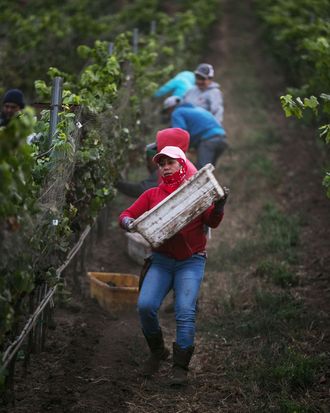
Few people realize it, but the sexual-assault rate among female farmworkers is among the worst in America: In one survey, a staggering 80 percent reported experiencing harassment of some kind, leading advocates to label it “a pandemic.” (For the sake of comparison, the national restaurant industry has more sexual-harassment claims on file than any other: Carl’s Jr. made headlines last year when a survey found that 66 percent of its female employees claim that they’d been harassed on the job, and that number is well above the industry average.)
It’s hard to pin down how many U.S. ag workers there are, but data suggests that the number employed illegally is very high (like 50, even 70 percent). It’s no wonder, then, that the rate of harassment and assault is so alarming. Besides abusers’ ability to wield the threat of deportation against this vulnerable workforce, these women are also working in rural areas where there’s sometimes not a soul in sight.
In a new report, The Atlantic details one particularly harrowing story about a Guatemalan worker who’d arrived in Florida to pick tomatoes. Her boss made sexual advances in the field that she successfully rejected, but this hardly solved her problems:
In 2011, she says, he promised to pay her more if she had sex with him, grabbed her from behind, and fondled her breasts. In August, according to the lawsuit, she says when she rejected his advances and threatened to call the police, he threatened to get her deported … After she rejected him, he showed her his pistol in his waistband, she says.
She tried to quit, but he responded by saying that he’d kill her if she did. She explains that she was afraid yet clueless about what to do: “I just arrived [in the U.S.] and I didn’t know anything about the laws or who to call or what I could say.”
The Atlantic reports that the farmer eventually got help from the Coalition of Immokalee Workers, a group whose worker activism on Florida tomato farms has been heralded as the most effective program for combating sexual abuse in the ag industry. CIW’s members have been working overtime to educate people about the awful conditions female farmworkers can face. Advocates like CIW, however, have an uphill battle.
They’ve tried leveraging #MeToo, but without much luck so far; after the Harvey Weinstein allegations broke, a group called the Alianza Nacional de Campesinas wrote a letter of solidarity with Hollywood women that said, “We wish that we could say we’re shocked to learn that this is such a pervasive problem in your industry. Sadly, we’re not surprised because it’s a reality we know far too well.” Groups also note that the support system in place in other industries doesn’t extend very well to women in ag jobs: Lots of them don’t have computer access, but sexual-harassment complaints often have to be filed online. And even if they felt empowered to come forward, the EEOC also has a dearth of rural offices, and advocates point out that they’re rarely staffed by people who speak Spanish anyway.




